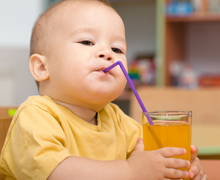
Parents aren’t given an instruction manual when taking their newborn babies home from the hospital so they have to rely on natural instincts and lessons from others. New research indicates lessons to future parents should probably include a stronger admonition against introducing fruit juice at an early age because it could lead to a greater intake of sugary drinks later in childhood resulting in higher odds for obesity and tooth decay.
Edwina Yeung and other researchers from the U.S. National Institute of Child Health and Human Development reviewed data from more than 4,000 mothers and published their findings in The Journal of Nutrition. The report said children who had been introduced to juice at an early age were 50% more likely to drink lots of juice later in childhood and 60% more likely to consume lots of soda.
The children were tracked from birth until the age of 7 and the research showed the daily intake of water was less for juice drinkers compared to children who were not introduced to juice at an early age.
The recommendation from the American Academy of Pediatrics is that 100% fruit juice not be introduced into a child’s diet prior to the one-year mark, if at all.
Responding to the research report, registered dietitian and childhood nutrition specialist Audrey Koltun said, "When asked, 'When is a good time to introduce juice to children?' I usually say 'never.'" She went on to say, Babies and children do not really need juice. "It has a high concentration of sugar and no fiber."
The study found a quarter of the moms introduced their children to juice before they were 6 months of age. Nearly 50 percent started giving their kid juice between 6 and 12 months, while the remaining 26 percent waited until after the one-year mark.
"In this study and with my clients, the word 'juice' can mean 100% fruit juice, fruit punch, fruit juice drink, and other beverages," Koltun said. "These other juices are sweetened with sugar, and/or high fructose corn syrup and some are colored with food dyes. The more that juice and other sweet beverages are given to children, the less they want water, stating it is too plain and has no taste."
Chair of pediatrics at Huntington Hospital, in Huntington, N.Y. Dr. Michael Grosso said, "Studies of this kind continue to drive home the point that investments in high-quality primary care for infants in the first 36 months of life—for every American—pay dividends in avoidance of downstream societal costs [which are enormous] and, of course, in fostering health for a lifetime."
